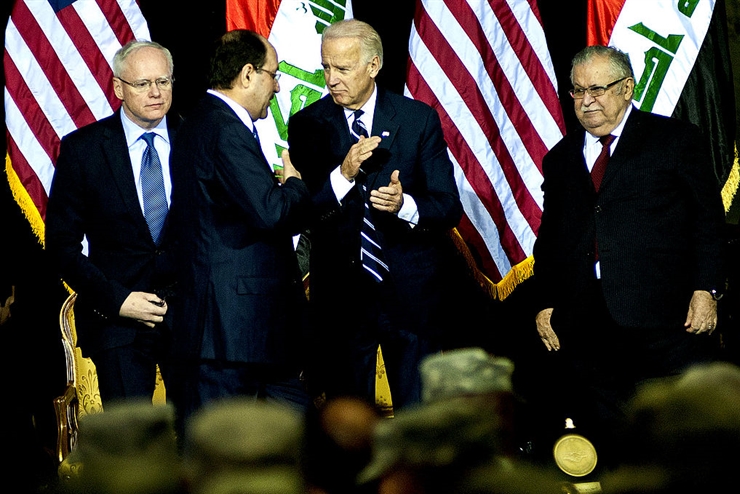People are policy and Joe Biden has 2,000 of them. That is, according to reporting in Foreign Policy magazine that his team of foreign policy and national security advisors has swelled to more than that number. A contingent of that size could be expected to produce a torrent of interesting ideas and fresh proposals, from the fundamentals of grand strategy to the minutiae of specific policies. The fruits of their labor are modest, however.
Biden’s team would have America reenter the Paris climate agreement, and adhere to the pledge to cut America’s greenhouse gas emissions 15 percent below 2005 levels by 2025. Biden would also return the country to the World Health Organization and resume contributions. He wants the U.S. to head a global coalition to find a coronavirus vaccine, showing the world that America is back solving global problems and restoring the liberal international order.
Thus far, we have conventional Washington opinion. The devil is in the detail, and on the vital issue of managing relations with China we get none. Supposedly, the most effective way to meet challenges from Beijing “is to build a united front of friends and partners to challenge China’s abusive behavior, even as we seek to deepen cooperation on issues where our interests converge, like climate change and preventing nuclear proliferation.” A tall order indeed.
With Russia there would be firmness, but also an attempt to forge a new arms control agreement. Biden would tighten the sanctions against Kim Jong Un’s regime, yet coordinate with South Korea and Japan “to advance our shared objective of a denuclearized North Korea.” On Iran, Biden would consider reentering the nuclear deal if Tehran resumed complying with it. He has said he would use force to preempt Iran from getting a nuclear weapon, but also that the only solution is “clear-eyed, hard-nosed diplomacy grounded in strategy, that’s not about one-off decisions or one-upmanship.”
Such platitudes and inanities were to be expected from the Obama loyalists who have given us eight years of failure. A dozen or so among them are likely to be in charge of U.S. foreign and security policy if Biden wins. “He is looking at an across-the-board restoration project,” said a former Obama administration official. The new team would restore the old exceptionalist hubris, which is extremely irritating to all those allies and partners Biden hopes to lead; and they will pander to special interests on a grand scale.
Biden likes to tell his audiences that he has extensive foreign policy experience obtained at the helm of the Senate Foreign Relations Committee and his diplomatic missions in his eight years as vice president, yet there is less here than meets the eye. He is a creature of the foreign policy machine par excellence, but not a single foreign policy success, great or small, can be associated with his name. Most notably, in 2010, tasked by Obama to wrap up the war in Iraq, Biden made a mess by betting on the hapless prime minister Nouri al-Maliki to play a pivotal role. This blunder arguably facilitated the subsequent rise of ISIS.
Obama’s ambassador to the United Nations, Susan Rice, who went on to become arguably the worst national security advisor since Harry Truman created the position, hopes to take charge at Foggy Bottom. Her chief rival for the post is Antony Blinken, Biden’s long-time principal advisor on world affairs, who has been deeply mired in the Swamp ever since co-founding WestExec Advisors. This firm, which supposedly provides consulting rather than lobbying services—and therefore does not fall under the Obama-era ban on employing lobbyists in government—has been involved in a Pentagon program to intensify drone warfare.
Blinken’s partner, Michèle Flournoy hopes to be the first woman to head the Pentagon. Flournoy served as undersecretary of defense for policy from 2009 to 2012. During her subsequent stint at Boston Consulting Group, the firm’s defense contracts rose nearly twentyfold. In 2014, Flournoy also became chief executive of the Center for a New American Security, securing $4 million in contributions from defense contractors during her tenure.
These are the creatures of the Swamp President Donald Trump had in mind this September, when he accused the Pentagon leadership of pushing for foreign wars in order to keep defense contractors profitable. Trump deliberately echoed former President Dwight Eisenhower, who warned of the rising power of the military-industrial complex in his 1961 farewell address.
Trump’s judgment is often imperfect, and on foreign affairs he has delivered less than he promised. But he is the first president since Richard Nixon to try to reinstate realism as the guiding principle of foreign policymaking. He has not been able to make a clean break with the establishment’s imperial pretensions and moral absolutism, but at least he has tried. Biden & Co. could not do so to save their lives.
Image Credit:
above: Iraqi Prime Minister Nouri al-Maliki talks to U.S. Vice President Joe Biden after gihe gave a speech during the Iraqi government’s Day of Commitment ceremony in the Al Faw Palace on Victory Base Complex in Baghdad, Dec. 1, 2011. U.S. Ambassador to Iraq James F. Jeffrey, far left, and Iraqi President Jalal Talabani, far right, participated in the ceremony, which commemorated the sacrifices and accomplishments of U.S. and Iraqi service members. [Image by: English: Master Sgt. Cecilio Ricardo / in the Public domain, via Wikimedia Commons, cropped and resized]



Leave a Reply